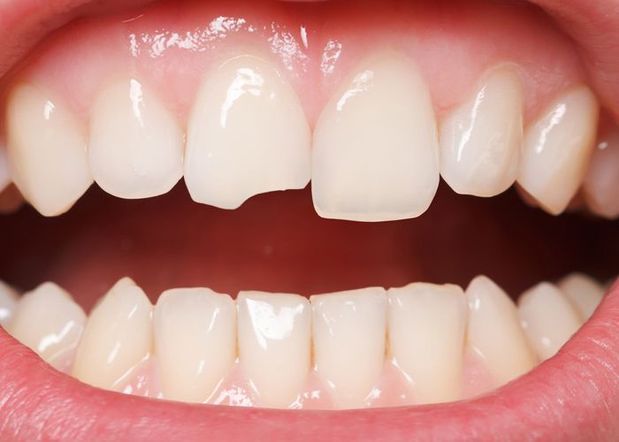Your Fast, Affordable Path to a Flawless Smile
Tired of noticing a chip, crack, or stubborn stain every time you smile? You’re not alone. Many people in Delaware want a cosmetic solution that improves their smile without the cost or commitment of more extensive procedures. Dental bonding may be exactly what you’re looking for—and it’s quicker and more affordable than you might think.
At Brown and Baran Family Dentistry, our experienced dentists use advanced cosmetic bonding techniques to correct minor imperfections with natural-looking results. With over 30 years of combined experience, Dr. Paul Brown and Dr. Christopher Baran have completed thousands of cosmetic and restorative treatments for patients across Wilmington and Seaford. Their training in modern adhesive dentistry ensures that your bonding blends seamlessly, functions comfortably, and lasts.
Call our Wilmington dental office at (302) 999-7600 or our Seaford dental office at (302) 536-7589 to schedule an appointment. New patients are welcome.
What Is Dental Bonding?
Dental bonding is a cosmetic dental procedure where a tooth-colored, putty-like composite resin is applied to your tooth, sculpted into the desired shape, and hardened with a special light. The result? A seamless repair that matches the color and shine of your natural teeth.
Composite resin has been widely studied and used in dentistry for decades. According to the ADA, modern tooth bonding materials are safe, durable, and highly effective for restoring the appearance and structure of the tooth.
Think of bonding as smile artistry. Dr. Brown and Dr. Baran thoroughly mold and polish the bonding material to cover imperfections, eliminate small gaps, and restore broken teeth, stained teeth, or even slightly crooked teeth.
Why Choose Brown and Baran Family Dentistry for Your Cosmetic Bonding?
Here’s why our patients choose us for their cosmetic dental needs:
- Local Care: Our Delaware dentists are deeply rooted in Wilmington and Seaford. You’re not just getting a generic dental office—you’re treated by experienced cosmetic dentists who understand the needs of our community.
- Affordable Cosmetic Dentistry: Compared to options like porcelain veneers, dental bonding is significantly more budget-friendly, making it an excellent first step and long-term solution for many patients.
- Quick, Same-Day Results: Many bonding treatments can be completed in one visit, often in under an hour for a single tooth. That means less time in the chair and faster transformations.
- Preservation of Your Natural Teeth: Dental bonding is non-invasive and requires minimal alteration of your enamel, helping preserve your natural tooth structure.
Is Dental Bonding the Right Solution for You?
Dental bonding is a remarkably versatile solution for many concerns. You might be an ideal candidate for dental bonding if you want to:
- Repair chipped or cracked teeth.
- Cover persistent stains or discoloration that don’t respond to teeth whitening.
- Close small gaps or spaces between your teeth.
- Reshape worn teeth or teeth that are uneven.
- Protect a portion of the tooth root that has been exposed due to gum recession.
Unlike porcelain veneers, which are custom-made in a lab, bonding is a direct procedure done entirely in our chair. This makes it a more conservative option that preserves more of your natural tooth structure.
The Dental Bonding Process at Brown and Baran Family Dentistry
One of the biggest advantages of tooth bonding is its simplicity and speed. We’ve designed our dental bonding procedure to be comfortable, fast, and efficient.
Your Consultation
The initial step is an in-depth consultation with one of our dentists to discuss your desired smile aesthetics. During this appointment, our Delaware dentists will assess your oral health to confirm that cosmetic dental bonding is the ideal solution for achieving your goals.
Pro Tip: If you’re considering a teeth whitening treatment, we recommend doing it before your bonding appointment so we can perfectly match the resin to your brightest, whitest smile.
Tooth Preparation
We gently prepare the tooth’s surface by applying a conditioning liquid. This creates a microscopically rough surface to help the bonding material adhere strongly. Anesthesia is typically not needed unless we’re filling a decayed tooth.
Bonding Application
After preparing the tooth, we carefully apply a tooth-colored composite resin. This resin is chosen to flawlessly match your natural tooth color and is then carefully sculpted onto the tooth to achieve the ideal shape and contour, effectively correcting any chips, cracks, or gaps.
Hardening and Polishing
Once the material is perfectly shaped, we use a curing light to harden it. The resin hardens in minutes. Finally, we trim, shape, and polish the bonded tooth until it blends indistinguishably with your natural teeth.
The entire bonding process is often completed in a single visit, usually in about 30 to 60 minutes per tooth.
Dental Bonding vs. Porcelain Veneers: A Clear Choice for Minor Fixes
Our dentists compare the two cosmetic dental treatments to be informed:
| Feature | Dental Bonding | Porcelain Veneers |
| Procedure Time | Often completed in one visit. | Requires at least two visits. |
| Cost | Most affordable upfront. | Higher initial investment. |
| Invasiveness | Minimally invasive; little enamel removal. | Requires removal of a small layer of enamel. |
| Durability | Lasts five to 10 years with proper care. | It can last 10 to 15 years or longer. |
| Best For | Quick fixes for chips, cracks, gaps, and stains. | A complete, long-lasting smile transformation. |
Bonding is excellent for quick improvements, but it can stain over time and is more prone to chipping than porcelain. If you want a full smile transformation or maximum longevity, veneers may be the better solution. Call our Wilmington dental office at (302) 999-7600 or our Seaford dental office at (302) 536-7589 to schedule a cosmetic dentistry consultation.
Caring for Your Newly Bonded Teeth
Your new bond is strong and durable, but it does require some simple care to ensure it lasts for years.
- Maintain Excellent Oral Health: Continue with regular brushing, flossing, and professional cleaning appointments at our office.
- Avoid Stains: Limit consumption of coffee, red wine, and tobacco, especially in the first 48 hours after your procedure.
- Protect Your Bond: Avoid bad habits like biting your nails, chewing on ice, or using your teeth as tools. If you grind your teeth at night, ask us about a custom night guard.
Frequently Asked Questions
No, dental bonding isn’t painful. Most patients find the dental bonding process to be completely pain-free. It’s typically so minimally invasive that anesthesia isn’t even necessary. If you’re particularly sensitive or we’re treating a cavity, we can ensure your comfort. It’s one of the easiest cosmetic treatments we offer.
The beauty of cosmetic bonding is its speed. For one to two teeth, you can often be in and out of our Wilmington, DE, or Seaford, DE, office in about an hour. It’s a fantastic solution for busy individuals seeking a fast smile upgrade.
Absolutely! Repairing chipped and broken teeth is one of the most common reasons patients choose tooth bonding. The composite resin is durable and artistically shaped to restore your tooth’s natural contour, making the repair virtually undetectable.
While dental bonding is versatile for many dental issues, it’s not always the best choice for larger restorations, severely worn teeth, or people with heavy biting forces. In those cases, porcelain veneers or dental crowns may provide better long-term durability.
Your dentist will assess your bite, enamel health, and cosmetic goals to ensure bonding is the right match for you.
Ready to Transform Your Smile? Schedule Your Consultation Today!
Don’t let minor flaws keep you from sharing your smile with the world. Dental bonding is the affordable, fast, and effective solution you’ve been searching for.
Contact the office most convenient for you:
- Our Wilmington, DE Office: Call (302) 999-7600
- Our Seaford, DE Office: Call (302) 536-7589
Let our friendly team at Brown and Baran Family Dentistry help you achieve the beautiful, healthy smile you deserve. Your satisfaction is our top priority.




